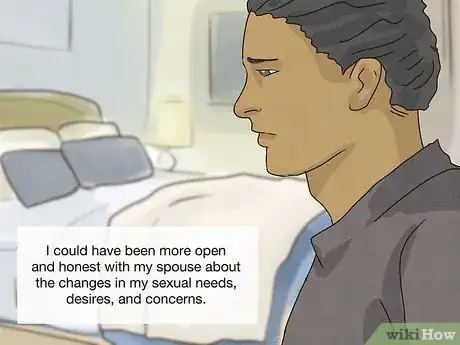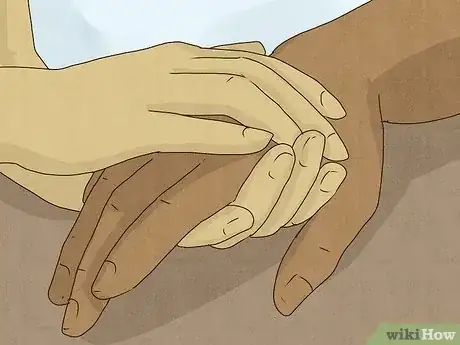This article was co-authored by Allen Wagner, MFT, MA and by wikiHow staff writer, Christopher M. Osborne, PhD. Allen Wagner is a licensed marriage and family therapist based in Los Angeles, California. He received his Master's in Psychology from Pepperdine University in 2004. He specializes in working with individuals and couples on ways they can improve their relationships. Along with his wife, Talia Wagner, he's the author of Married Roommates.
There are 12 references cited in this article, which can be found at the bottom of the page.
This article has been viewed 5,892 times.
All marriages ebb and flow, but it’s definitely time to take action if you’re worried that your marriage is on the brink of divorce. The good news is that marriages often can be rescued from this precipice with a mix of self-reflection, open communication, and cooperative action. This article lists helpful strategies for evaluating your marriage, evaluating yourself, and moving forward with the right plan for your situation.
Steps
Expert Q&A
-
QuestionHow do you Respark a relationship?
 Laura BilottaLaura Bilotta is a Dating Coach, Matchmaker, and the Founder of Single in the City, her dating and relationship coaching service based in Toronto, Ontario, Canada. With over 18 years of experience, she focuses on helping singles date more intentionally, encouraging them to let go of negative patterns so that they can attract the love that they deserve. Her experience, skills, and insights have led to thousands of successfully united over 65,000 singles through events and one-on-one matchmaking coaching sessions. She has been the host of The Dating and Relationship Show on Global News Radio 640 Toronto (AM640) for 6 years and is known as The Hookup Queen of Clubhouse; her popular singles club, Single in the City, has over 95.5K members who regularly join in weekly dating and relationship-focused rooms.
Laura BilottaLaura Bilotta is a Dating Coach, Matchmaker, and the Founder of Single in the City, her dating and relationship coaching service based in Toronto, Ontario, Canada. With over 18 years of experience, she focuses on helping singles date more intentionally, encouraging them to let go of negative patterns so that they can attract the love that they deserve. Her experience, skills, and insights have led to thousands of successfully united over 65,000 singles through events and one-on-one matchmaking coaching sessions. She has been the host of The Dating and Relationship Show on Global News Radio 640 Toronto (AM640) for 6 years and is known as The Hookup Queen of Clubhouse; her popular singles club, Single in the City, has over 95.5K members who regularly join in weekly dating and relationship-focused rooms.
Dating Coach & Matchmaker We tend to get complacent and we stop trying to impress our significant other, but it shouldn’t be this way. You can spice up your relationship by having date night at least once a week. Don’t have any distractions during your date night. Try some new sex toys or even try playing out each other’s fantasies, it is always good to have more communication when it comes to sex. Get back to touching, kissing, foot rubs, playing footsies, back rubs, etc. It doesn’t have to always be sexual. But don’t underestimate the power of touch.
We tend to get complacent and we stop trying to impress our significant other, but it shouldn’t be this way. You can spice up your relationship by having date night at least once a week. Don’t have any distractions during your date night. Try some new sex toys or even try playing out each other’s fantasies, it is always good to have more communication when it comes to sex. Get back to touching, kissing, foot rubs, playing footsies, back rubs, etc. It doesn’t have to always be sexual. But don’t underestimate the power of touch.
References
- ↑ https://time.com/30921/recipe-for-a-happy-marriage-the-7-scientific-secrets/
- ↑ Moshe Ratson, MFT, PCC. Marriage & Family Therapist. Expert Interview. 18 September 2019.
- ↑ https://www.mentalhelp.net/blogs/on-the-brink-of-divorce-how-they-recovered/
- ↑ https://www.psychologytoday.com/us/blog/resolution-not-conflict/201303/marriage-problems-heres-8-step-rescue-plan
- ↑ https://www.psychologytoday.com/us/blog/resolution-not-conflict/201303/marriage-problems-heres-8-step-rescue-plan
- ↑ Jin S. Kim, MA. Licensed Marriage & Family Therapist. Expert Interview. 14 May 2019.
- ↑ Moshe Ratson, MFT, PCC. Marriage & Family Therapist. Expert Interview. 7 August 2019.
- ↑ https://www.gottman.com/blog/10-things-try-giving-marriage/
- ↑ Raffi Bilek, LCSW-C. Licensed Certified Social Worker – Clinical. Expert Interview. 15 October 2021.
- ↑ Allen Wagner, MFT, MA. Marriage & Family Therapist. Expert Interview. 24 September 2021.
- ↑ Lauren Urban, LCSW. Licensed Psychotherapist. Expert Interview. 3 September 2018.
- ↑ https://www.gottman.com/blog/10-things-try-giving-marriage/
- ↑ https://www.gottman.com/blog/10-things-try-giving-marriage/
- ↑ Laura Bilotta. Dating Coach. Expert Interview. 26 February 2020.
- ↑ https://www.gottman.com/blog/10-things-try-giving-marriage/
- ↑ Allen Wagner, MFT, MA. Marriage & Family Therapist. Expert Interview. 24 September 2021.
- ↑ Laura Bilotta. Dating Coach. Expert Interview. 26 February 2020.
- ↑ https://www.gottman.com/blog/10-things-try-giving-marriage/
- ↑ https://psychcentral.com/lib/when-one-spouse-wants-out-of-the-marriage-but-the-other-doesnt#1
- ↑ Moshe Ratson, MFT, PCC. Marriage & Family Therapist. Expert Interview. 7 August 2019.





































































